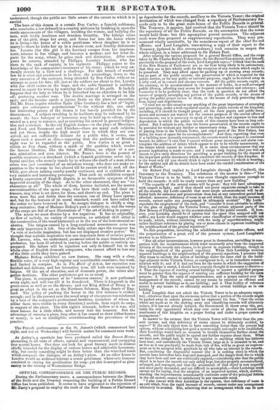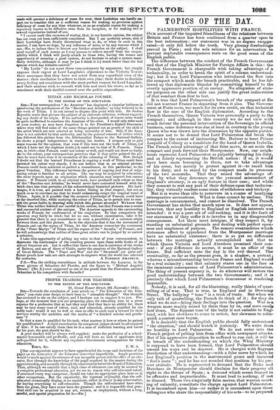OFFICIAL CORRESPONDENCE ON THE PUBLIC RECORDS.
During the Parliamentary recess, a correspondence between the Master of the Rolls and the Treasury respecting the building of a Public Record Office has been published. It seems to have originated in the rejection of Barry's proposal to employ the roofs of the New Houses of Parliament as depositories for the records, ancillary to the 'Victoria Tower; the original destination of which was changed from a repository of Parliamentary Re- cords only to be the great store-house of the Public Records in general. The Treasury, it appears, had resolved that the Victoria Tower should be the repository of all the Athlic Records, on the assumption that the tower would hold them: but this assumption proved erroneous. The adjacent roofs were then proposed as supplementary repositories. They were pro- nounced wholly unsuitable, by the unanimous report of the chief Record officers; and Lord Langdale, transmitting a copy of their report to the Treasury, (printed in this correspondence,) took occasion to reopen the whole subject, in a letter addressed to Sir Robert Peel. After relating the various proposals for a general Record Office, and the steps taken by Mr. Charles Buller's Committee, the late Record Commission, and himself, previously to the proposal of the roofs, Lord Langdale says—" I think that the roofs of the New Houses of Parliament are so far from being likely to be satisfactory,
that they are in fact wholly unfit for the reception of any records which ought to be preserved. They may afford space for packing up or stowing away records; but no part. of the public records, the preservation of which is required for the public service, or for any public or national purposes, ought to bestowed away in. a lofty roof, or in remote and obscure recesses. All the public records ought, on the contrary, to be accommodated in the manner of books, in to well-arranged public library, affording easy access for frequent consultation and reference: and I conceive it to be perfectly clear, that the roofs in question do not afford the means of properly arranging any portion of the public records, or the means of giving the public proper access to them, or the means of duly protecting them from injury and depredation.
"I need not on this occasion say anything of the great importance of arranging and preserving, under a well-regulated system, the public records of the kingdom, including, if it should be thought proper, all the state papers and public docu- ments and accounts not wanted for the current purposes of the several offices of Government; nor is it necessary to speak of the neglect and exposure to loss and depredation to which the public records of this country have been so long sub-
beted. But I submit to you, that the future preservation of the records ought to provided for without any further or unnecessary delay. The wish or intention of placing them in the Victoria Tower, and other parts of the New Palace' lies failed, for want of space for its accomplishment." And then, regretting that even if a building were instantly commenced, the records would be exposed to continual hazard, he adds—" I own that I cannot without great uneasiness and alarm con- template the addition of delays which appear to me to be wholly unnecessary, to the delays -which cannot be avoided. It is under these circumstances that my present application is made to you; and I cannot help hoping that you will see reason to give early directions for providing a proper building for the deposit of the important public documents which constitute the records of this kingdom. It is the word only (if you should think it right to pronounce it) which is wanting; for the subject and all its details have been under the careful consideration of the Board of Works."
Sir Robert Peel replied to Lord Langdale through Mr. Cardwell, the Secretary to the Treasury. The substance of the answer is this—" The Victoria Tower is to be built: it was once thought capacious enough to hold the records: it will be ready sooner than any new building." "The capacity of the several rooms will be great; they will have advantages.
with respect to light; and if they should not prove capacious enough to take in all the records, my Lords consider that more ample accommodation will be af- forded both for reference and preservation than has at any antecedent period been afforded: moreover, deficiency of room is an evil which, from the rapid increase of records, cannot under any arrangement be ultimately avoided." "My Lords repudiate the employment of the roofs, and "consider it most advisable to adhere to the plan of applying the Victoria Tower, and certain adjacent parts of the New Houses of Parliament, to the accommodation of the public records. Ifs how- ever, your Lordship should be of opinion that the space thus assigned will WI suffice, my Lords would suggest whether some classification of records might nut be made, which, without interfering with the unity of superintetalence, 'Mg&
i
rather facilitate reference by placing one or more classes in separate buildn'ige-in the neighbourhood of the general repository."
To this proposition, involving the establishment of separate offices, and the perpetuation of a great evil of the present system, Lord Langdales answer is as follows-
" But all other inconveniences, however great in themselves, aretriffing in com- parison with the inconveniences which must necessarily arise from the suggested division of the records into classes, to be placed in separate buildings, though in the neighbourhood of the .general re isitory. When their Lordships mention separate buildings in the neighbour-h... of the general repository, I presume that they mean to exclude the notion of buildings under the same roof as the build- ings adjacent to the Victoria Tower, or contiguous to it, or in immediate commu- nication with it; and if it had not been for the terms in which the suggestion of their Lordships is stated, I should have scarcely thought it necessary to observe-- 1. That the expense of erecting several buildings to answer a specified purpose must be greater than the expense of erecting one sufficient building for the sera% purpose; 2. That the unity of superintendence, and a proper control over 'this management of the records, cannot by any means be rendered as efficient and useful in several buildings as in one building; and 3. That facility of reference cannot by any means be so efficiently secured in several buildings as in one building. Lord Langdale does not admit the Victoria Tower to be an adequate reposi- tory, otherwise than upon the erroneous notion that a portion of the records might be packed away in remote places; and be expresses his fear, " that the errors which are made as to the stowing away and classifying records will ultimately induce, if it has not already induced, the Government to throw away this, pro- bably the only opportunity which may ever occur of placing the records and muniments of this kingdom on a proper footing and under a proper system of management."
In answer to the excuses that the Victoria Tower will be better than the pre- sent system, and that deficiency of rooms cannot be ultimately avoided, he says—" If the only object were to have something better than the present bad system, without considering how good a system might and ought to be established, their Lordships would have no occasion to trouble themselves further about the records, and the public might be spared any further expense about them. What we have now, though bad, is very far superior to anything which bas hitherto. been bad; and undoubtedly the Victoria Tower, large as it is intended to be, and as free as it can practically be made from risk of fire, willbe so great an improve- ment as to be accepted with gratitude by all who take an interest in the records. But, considering the disgraceful manner (for it is nothing else) in which the records have heretofore been kept and managed, and the danger from fire to which they have been and now are continually exposed,—considering also that the public object is to have the records not only safely. kept, but also properly accommodated, arranged, and managed, and that the attainment of that object is now urgently and most justly demanded, and not difficult to accomplish,—their Lordships must excuse me for saying, that the adoption of an improved system, which, notwith- standing the improvements, unnecessarily continues some of the principal defects in the old system, cannot be satisfactory to any reasonable mind.
" I also concur with their Lordships in the opinion, that deficiency of room is an evil which, from the rapid increase of r-swr6, cannot under any arrangement ultimately be avoided. But, admitting that no arrangement which can be now made will prevent a deficiency of morn for ever, their Lordships can hardly ea-
ppeecctt to consider this as a sufficient reason for making no provision against deficiency of room for any time whatever, or as an available reason for making a repository known to be defective even from its inception, or for making two or several repositories instead of one. " I cannot omit this occasion of stating, that, in my humble opinion, the subject has not even yet been sufficiently considered. But I am perfectly aware, that if their Lordships have finally determined what to do, or what to omit in this matter, 1 can have no hope, by any influence of mine, or by any reasons which I can ffer, to induce them to bestow any further attention on the subject. I shall avail myself of such means as I may possess to relieve myself from the respon- sibility which I think will justly attach to those who, having the means and opportunity of securing a good system, do not hesitate to adopt a system mani- festly defective, although it may be. (as I think it is) much better than the bad system which has hitherto existed."
My Lords" do not meet these remonstrances by argument, but simply express their regret at Lord Langdale's objections to the Victoria Tower; their assurance that they have not acted from any superficial view of the matter; their resolution to adhere to their own plan ; their desire to disclaim every feeling not consistent with the most perfect respect for Lord Langdale, and their anxious wish to consult with him and meet his views, so far as is consistent with their dutiful control over the public expenditure.



























 Previous page
Previous page